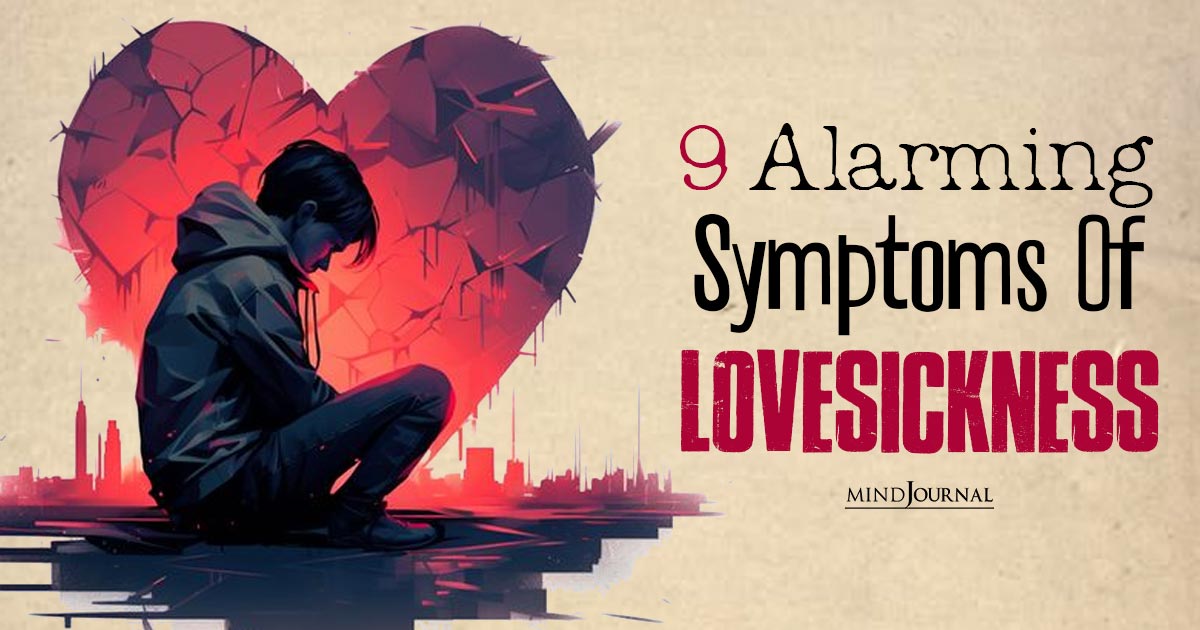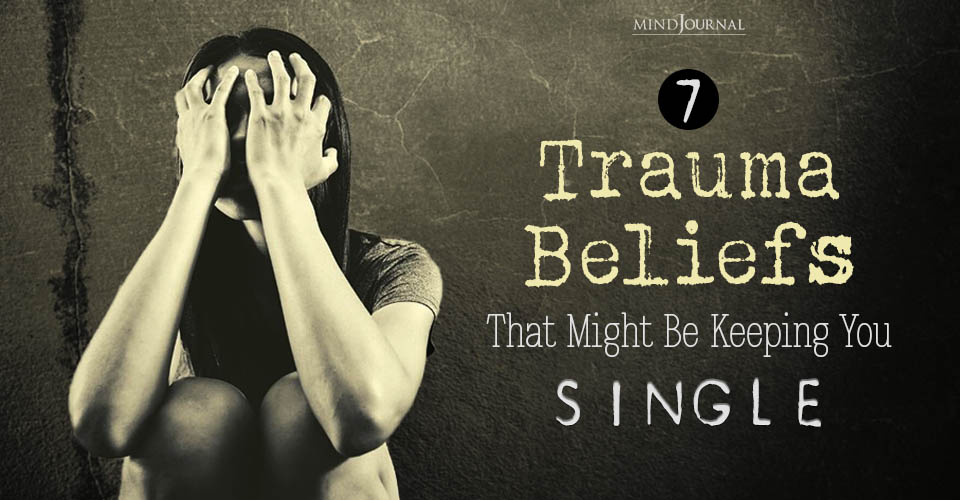Have you been taken over by a whirlwind of feelings for someone? Is your crush or lover the only thought in your mind? Then you just might be lovesick. Lovesickness can be both joyful and tormenting. Understanding the symptoms of lovesickness can help you get over it and transform love into a more positive experience.
Love is a beautiful yet confusing emotion. It fills your heart with bliss and misery at the same time. Love can consume your entire being as you experience the highest of highs and lowest of lows. However, lovesickness can be a very intense emotion that can be difficult for some individuals to manage.
So let us explore what is lovesickness, the symptoms of lovesickness, and how to get over being lovesick so that you can build healthier relationships and a happier life.
What is Lovesickness?
Often seen as an affliction, lovesickness refers to intense emotions that result from being emotionally or physically away from the person you love. It is often considered as a negative emotion experienced by individuals who are deeply in love with another person.

Lovesickness may be experienced in different scenarios such as unrequited love, the inability to express your love to your crush, the absence of your partner or even the passing away of a loved one.
Related: 9 Surprising Psychological Facts About Love And Attraction
So what is lovesickness? It is an emotional condition characterized by overwhelming longing or distress experienced when deeply infatuated with someone or after experiencing unrequited love.
It’s an amazingly complex amalgamation of feelings, which may occupy our thoughts and change our behaviors, resulting in feelings of despair and yearning.
According to lovesickness psychology, it is often regarded as a disorder which develops due to our past experiences and attachment style. Lovesickness is more likely to be found in individuals with anxious attachment styles whose issues stem from fear of rejection or being abandoned.
Similarly, unresolved emotional wounds and past traumas may intensify lovesickness symptoms as they trigger deep-seated insecurities and fears.
9 Telltale Symptoms of Lovesickness That May Be Affecting You
Wondering what lovesickness looks like in reality? Here are some of the most common signs and symptoms of lovesickness that you must know about –
1. Obsessive Thoughts
A clear indicator of being lovesick is when one finds themselves thinking about their loved one consistently in their mind. Our minds become filled up with our loved one and all day long we replay memories and imagine scenarios, while we yearn for their presence.
2. Emotional Turmoil
One basic sign about being lovesick is that it can lead to severe mood fluctuations. When someone reciprocates our love, we might experience immense joy and happiness. However, when love is unrequited or when our relationship faces problems, we can experience depression, sadness, and even despair.
3. Loss of Appetite and Sleep Disturbances
The intensity with which a person goes through such emotional turmoil can have significant effects on their physical health. Some people may lose their appetite, lose weight, and experience insomnia or restless nights that are colored by the dreams of their loved ones.
4. Decreased Concentration
According to lovesickness psychology, it can have a strong impact on our ability to focus on responsibilities, making us incapable of completing tasks on time. Your mind may constantly think about the object of your desire as you keep daydreaming about all the possible scenarios that can happen.
5. Isolation and Withdrawal
Feeling lovesick tends to make people shy away from social settings. There is a sense of feeling insecure and anxious about being judged, or rejected by others. In some instances, you may withdraw yourself frequently, which may result in social isolation.
As a result, you may start losing interest in activities that you previously enjoyed. This is one of the major symptoms of lovesickness.
6. Physical Symptoms
Lovesickness can also manifest physically. Headaches, stomach aches, heart palpitations, or even extreme tiredness & exhaustion are some of the symptoms that could appear when one is deeply lovesick.
Related: 7 Ways Your Body Repels A Wrong Partner
7. Insecurity and Jealousy
When we feel that our love relationships are threatened or when we are afraid that we may lose our partners’ affection, we can experience feelings of insecurity and jealousy.
Furthermore, these emotions may aggravate lovesickness leading to more emotional turmoil, mood swings, and suffering.
8. Idealization and Unrealistic Expectations
When somebody falls into the trap of being lovesick, it becomes very easy for them to place the person they love so much on a pedestal where they overvalue and idealize them.
We may have unrealistic expectations from our partner or the relationship, setting ourselves up for disappointment and heartache.
9. Emotional Dependency
Lovesickness often comes with deep emotional attachment towards someone you desire the most. You may become emotionally dependent on their validation, attention, and presence.
You may also become needy for constant reassurance from your loved one to reduce your emotional turmoil.

6 Tips on How to Get Over Being Lovesick
Feeling lovesick can be a miserable experience for some individuals. As lovesickness can involve negative emotions, it is crucial that we learn how to manage such difficult emotions.
Here are helpful tips on how to get over being lovesick and build healthier relationships with yourself and others –
1. Acceptance and Self-Compassion
Respect and accept your emotions without judgment. Understand that lovesickness is a natural reaction to strong emotions and that it will take time for you to recover. Treat yourself well and practice self-care during this duration.
2. Seek Support
Approach family members or trusted friends who can lend you an ear and provide emotional support. Letting others know how you feel can help lessen the burden & bring in a new perspective.
3. Engage in Positive Distractions
Get busy by engaging in activities that make you happy and fulfilled. Exercise, indulge in hobbies, immerse yourself in art, or discover new interests. These positive diversions will help focus your mind away from the object of your affection, promoting personal development.
Related: Do You Crave Love? 7 Signs Of Emotional Hunger
4. Practice Mindfulness
Try being more mindful through practices like mindful meditation which improves awareness of thoughts, and emotions without judgment or criticism.
Self-reflection can help understand how thought patterns contribute to lovesickness so that they can be overcome positively.
5. Challenge Irrational Thoughts
Lovesickness often involves distorted thinking patterns, such as catastrophizing or excessive self-blame. Challenge these irrational thoughts by questioning their validity and replacing them with more realistic and compassionate thoughts.
6. Seek Professional Help
If lovesickness is negatively affecting your life or mental health in the long run, consult a psychologist. They can provide guidance, offer coping strategies, and help you navigate the healing process.
Takeaway
Lovesickness is a deep and complex emotional state that most of us have gone through at some point in our lives. However, it must be remembered that even though it may be a difficult experience, it is a temporary state.
Understanding what is lovesickness, the symptoms of lovesickness, and how to get over being lovesick can help us get over this affliction with time. So, embrace the journey of healing, and remember that love, in all its complexities, has the power to transform and inspire us.
Related: Signs Of Untrue Love: 6 Ways To Distinguish Authentic Love from Counterfeit Connections
Frequently Asked Questions (FAQs):
What are symptoms of lovesickness?
Symptoms of lovesickness include different emotional and physical manifestations, such as longing, sadness, loss of appetite, and sleep disturbances.
How long does lovesickness last?
The duration of lovesickness varies depending on the individual and the circumstances, lasting from weeks to months.
Can you be lovesick for a crush?
Yes, you can feel lovesick for a crush, as intense feelings of infatuation can trigger lovesickness.










Leave a Reply